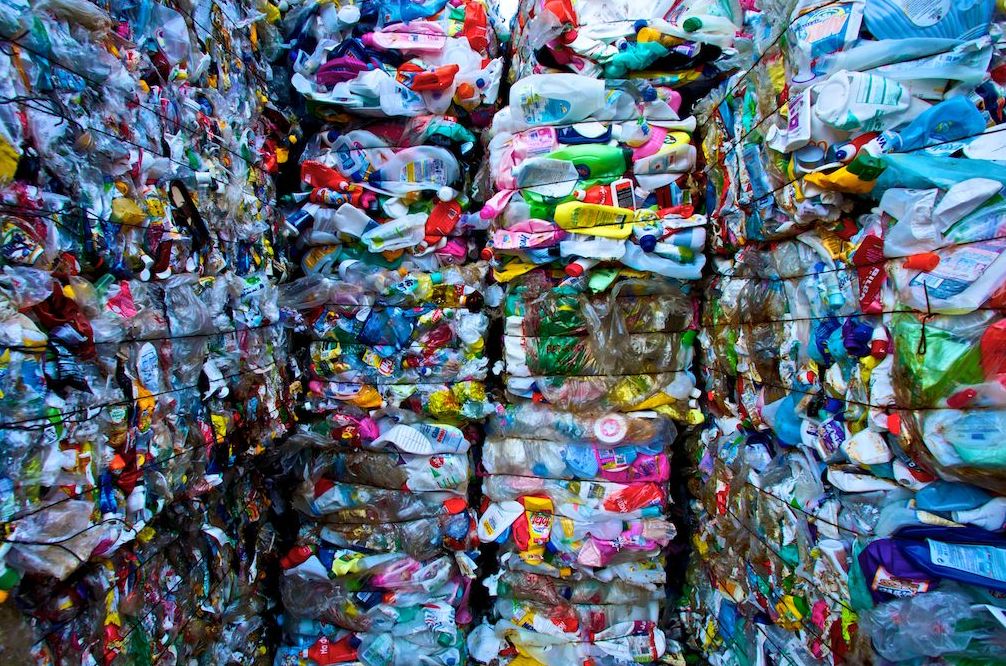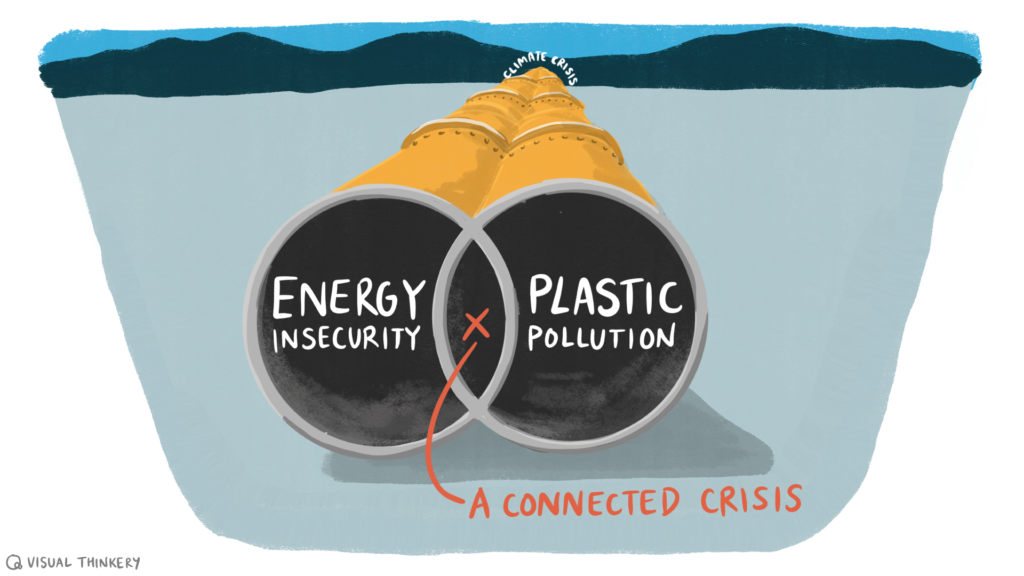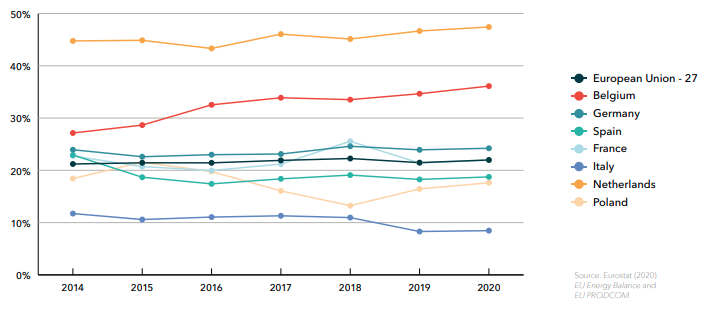Scientists and climate activists have highlighed and warned against the significant global warming impact of fossil gas and an expansion of related infrastructure. Furthermore, analysts have also repeatedly criticized Europe’s deep dependency from Russia – created particular by Germany with the help of petrochemical giant BASF and it’s daughter Wintershall Dea. Putin’s war in Ukraine is forcing the EU now to profoundly restructure it’s energy landscape and to save gas for the coming winter. But while the public is being told to shower cold and heat less Europe is still feeding a fossil fuels hungry petrochemicals and plastics industry. Andy Gheorghiu outlines the major findings of a new report that reveals the significant dimension of this gluttony and that calls for a profound new diet for this sector.

Petrochemicals and plastics industry. (Photo by mbeo, CC BY-NC-ND 2.0)
The dash for new gas infrastructure – really serving households?
No one who carries political responsibility these days can actually ignore any longer the unfolding dire impacts of global warming or the need to radically transform our energy systems and economies. However, instead of now pushing forward with the much needed energy transition, EU member states support the construction of new LNG terminals for imports of fracked US gas or call for expansion of extraction in Africa. The gas industry makes use of the war in Ukraine and feeds fears of electricity blackouts or freezing households to push for a large amount of climate hostile fossil infrastructure.
In Germany, the government (formed of liberals, socialists and greens) has implemented an LNG accelaration bill that defines the fossil fuel as being of overriding public interest – while partially skipping environmental impact assessments as well as public participation and rights of action against the projects. The given main reason for these radical measures that might have dire impacts on any future environmental and climate protection work in the future is the need for the securement of the livelihood for the general public. However, a freedom of information request – filled by the German Exit Plastik alliance earlier this year – revealed that the government doesn’t know how much oil and gas the petrochemical industry what for exactly consumes.
Given the fact that proposed LNG terminals at three main locations will become an integral part of existing petrochemical clusters this „knowledge gap“ got climate and plastic activists very curious. The question is: Who will actually benefit from this dash for new gas infrastructure and is its purpose really to serve households?

Fig. 1: A Connectd Crisis. © Break Free From Plastic & the Centre for International Law (CIEL)
Less heating but continued plastic production and pollution?
Against this background and the committment of EU member states to reduce gas consumption by at least 15% by 31 March 2023, Break Free From Plastic and the Centre for International Law (CIEL) worked on the recently published „Winter is coming – plastic must go“ report. It’s revelation and major findings are significant and must receive the attention of EU’s political decision makers:
- Plastic production is by far the largest industrial oil, gas, and electricity user in the EU, overshadowing other energy-intensive industries such as steel, automobile manufacturing, machinery, and food and beverages. It was responsible for nearly 9% and 8% of the EU’s final consumption of fossil gas and oil, respectively, in 2020. This is about as much as the final gas consumption of the Netherlands and almost as much as the final oil consumption of Italy in 2020.
- Plastic production is also the most energy- and feedstock-intensive of all the processes of the petrochemicals industry. When looking at industry alone, It accounts for a fifth (21.98%) of industrial gas and two-fifths (37.58%) of industrial oil consumption in the EU. The largest part of this energy was used to produce plastic packaging, which accounts for 40% of the end market for plastic products in the EU.
- This represents about 10 billion cubic metres (bcm) of fossil gas and 14 million tonnes (mt) of oil. This is about as much as Hungary’s final gas consumption in 2020, and Sweden and Denmark’s combined oil consumption in 2020.
- Nearly 15% of the final gas consumption and 14% of the final oil consumption in 2020 in the EU 27 was used to manufacture petrochemicals.
- In the EU in 2020, 38% of the gas and 22% of the oil came from Russia, making the energyintensive petrochemical industry significantly reliant on Russian fossil fuels.
- Together, Belgium, Germany, Spain, France, Italy, the Netherlands, and Poland are responsible for 77% of all plastic packaging waste in the EU. Achieving reductions of 50% in plastic packaging and 90% in recycling would lead to a reduction of 6.2 bcm of fossil gas and 8.7 million tonnes of oil at the EU level compared to 2020. These figures are the equivalent to the Czech Republic’s final oil and gas consumption in 2020.

Fig. 2: Final gas consumption for plastic production in the EU in 2020 (in bcm). Source: Eurostat (2020).
EU Energy Balance and EU PRODCOM. © Break Free From Plastic & the Centre for International Law (CIEL)
Translated in absolute numbers, the amount of fossil gas going into plastic production corresponds to 25 bcm in 2020. Germany alone consumes approximately 7 billion cubic meters (bcm) for its plastic production, followed by the Netherlands with 4.5 bcm (Figure 2).
However, the numbers are even more striking when looking at the gas consumption of Europe’s industrial sectors alone (Figure 2). Plastic production in the EU consumes more than one-fifth (22%) of all fossil gas consumed by all European industry sectors. In Germany nearly a quarter (24.22%) and in Belgium, more than a third (36.11%) of the industrial sector’s gas consumption goes into plastics. In the Netherlands, plastic production is responsible for nearly half of all fossil gas consumed in the industrial sectors.

Fig. 3: Share of industrial gas consumption for plastic production in the EU 2014-2020. Source: Eurostat (2020).
EU Energy Balance and EU PRODCOM. © Break Free From Plastic & the Centre for International Law (CIEL)
Faced with multiple existential crises, the EU and its member states must act bold and swiftly. However, a prolonged fossil fuelled business-as-usual is no longer an option. Reduction of plastic production and consumption is an quite easy way to tackle the multiple crises we’re confronted with: plastic, energy, climate!
The authors of the report recommend politicians doing the following:
- A first and easy step in achieving a drastic reduction of virgin plastic production is for the EU Member States to accelerate and expand the implementation of the Waste Framework and Single-Use Plastics Directives, increasing the level of ambition, notably by adopting prevention and reuse targets. Such action will also reduce oil and gas consumption.
- The EU and its Member States need to seize the opportunity of the revision of the PPWD, to adopt ambitious measures on packaging reduction. These should include a cap on overall packaging put on the EU market that would decrease over time, and the development of reuse systems, powered by ambitious and binding reuse targets. The EU should, in particular, consider using the PPWD vehicle to ban further unnecessary packaging such as single-serving sachets and wrapping of fruits and vegetables, and to prohibit overpackaging.
- The EU cannot afford to wait another three decades to reduce by 40% its virgin plastic use in the packaging and household goods, automotive, and building sectors, as put forward even in industry-sponsored proposals by Plastics Europe and SYSTEMIQ.11. Reducing production from 50 to 29 megatonnes (Mt) should be achieved by 2030.
- Reacting to the threat of a supply cut from Russia, EU Member States have agreed to reduce gas consumption by at least 15% by 31 March 2023. But this measure falls far short of what is needed. For the immediate future and in light of expected gas shortages over the coming months, the EU and its Member States need to ensure that emergency measures restrict non-essential industry oil and gas use, for example, the share that would typically go to producing unnecessary single-use plastics and packaging. The scope of such restrictions needs to mirror the scale of the crisis and be implemented in a way that protects workers and low-income households.
- The EU and its Member States need to push for ambition on upstream measures within the negotiations of the Global Treaty to End Plastic Pollution, including the following: recognition of sourcing and feedstocks in defining the full plastics life cycle, a global cap on overall plastics production, and recommendations to begin phasing down plastics production with initial limitations on the production of particularly problematic or unnecessary plastics.
- The EU and its Member States must stop building new fossil fuel infrastructure, including petrochemical facilities, starting with a moratorium or freeze on permitting of new virgin plastic production facilities.
- EU and Member State attempts to secure oil and gas from Africa, the US, and elsewhere, offer only a short-term fix for a long-term problem, while deepening the climate crisis and imposing significant environmental and health costs on the countries and communities where extraction occurs. Attempts to address the crisis must be rooted in lowering all fossil fuels consumption while laying the foundation for a just transition, not enabling the building out of new infrastructure. Thus, the EU’s climate and energy diplomacy should be based on securing climate-friendlier energy access and climate justice, and be used to fulfill its commitments, including financial ones, under the EU Green Deal, the United Nations Framework Convention on Climate Change (UNFCCC), and the Paris Agreement.
- The EU and its Member States must engage with the European petrochemical industry to set up decarbonisation plans and a fossil-free future pathway, and a needed just transition for this sector.
People are being told to save energy, shower cold and heat less while at the same time we’re still feeding the European petrochemicals and plastics industry with enormous amounts of oil and gas for a lot of toxic and non-essential products.
Winter is coming which means now is the time to end wasting precious energy for plastics while also reducing our dependency from Russia at the same time. This is actually not an option- it’s a must!